First CAR T-cell trial for myeloma a success for Andrew
The infusion of re-engineered T-cells that has made Andrew Dodd’s relapsed myeloma “disappear” took 10 minutes to administer. Nothing much appeared to be happening at the time, but 12 people – including doctors, nurses, the clinical trials team and others – were there, watching.
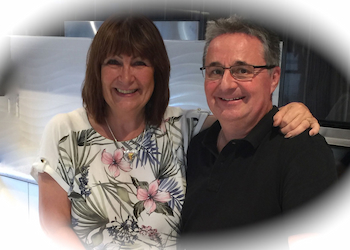
“There was no show of any type,” said Andrew, but it was a significant event.
He was the first person in Western Australia to have CAR T-cell therapy for myeloma, on the international CARTITUDE-4 trial.
In the 11 months since then, Andrew has been closely monitored, and while he’s been told it is still early days, there is no evidence he has any active disease.
Life before Andrew’s myeloma diagnosis
Andrew started feeling pain down his left leg in July 2017. He thought it was sciatica and went to the physio, then he started taking painkillers, and in late August, his GP sent him for blood tests. When these showed “some anomalies”, Andrew had a series of tests – an endoscopy, colonoscopy, and a thyroid check.
“When nothing came back, she sent me for a CT scan which showed a hole the size of a golf ball in my sacroiliac joint,” explained Andrew, 61, a former self-employed construction estimator. He and his wife, Vivienne, live in Dawesville, an hour south of Perth.
“The pain was caused by the nerve rubbing across the rough edges of this hole.”
Still unsure what the problem was, specialised blood tests were ordered. The results “indicated there was a high probability that I had myeloma”, said Andrew, something he’d never heard of, and it was a shock.
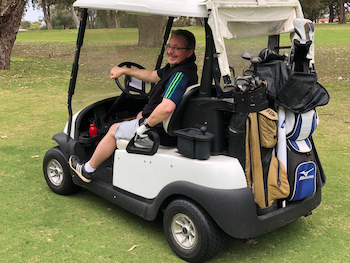
“It’s not the sort of thing you expect… to go to your doctor for a blood test result and then to be told there’s a chance you’ve got some sort of cancer.”
He was referred to Perth’s Sir Charles Gairdner Hospital and to a haematologist and when a bone marrow biopsy was inconclusive, Andrew had a second biopsy under CT scan which confirmed he had myeloma.
“I seem to remember my doctor saying they thought it might be stage II,” said Andrew.
It was the end of September and preparations were made for him to have a stem cell transplant. Andrew had to stop work and mothball his business when he began four cycles of bortezomib (Velcade® ), cyclophosphamide and dexamethasone (the VCD regimen). Then his stem cells were harvested, which took him up to Christmas.
In January 2018, in the lead up to his autologous transplant, Andrew had high-dose chemotherapy and surgery to insert a central line in his neck, with five lumens, used to collect blood, give medication, and to give him back his stem cells for the transplant on February 21.
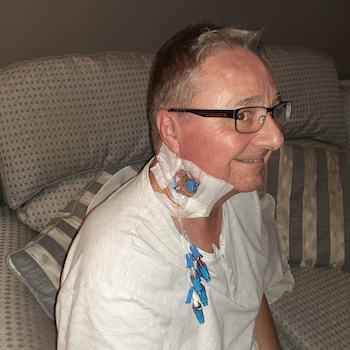
During the following two weeks he was in hospital, Andrew felt “pretty nauseous and sick”, then he was discharged and had regular tests and checks.
In July 2018, Andrew started thalidomide as a maintenance therapy, but he had to stop this after about four months when he started getting peripheral neuropathy in his feet.
“I was okay until the following June, when I relapsed,” said Andrew, who had returned to work part-time and was gradually rebuilding his business.
“My clients came back to me, which was both fortunate and reassuring.”
His next treatment was lenalidomide (Revlimid®), which he was on for “about a year.” When a PET scan showed a new lesion on his left femur, this was treated with targeted radiotherapy daily for two weeks.
“That resolved that problem, and I was okay until August last year [2020], when I relapsed again.”
“I had a PET scan to help with the diagnosis because it [myeloma] wasn’t showing up in my blood so much anymore. I was diagnosed with progressive oliosecretory myeloma with the added complication of extramedullary involvement.”
“The myeloma had got out of my bones into my soft tissue. My myeloma had changed, and the prognosis was not so good,” he explained.
The clinical trial experience
“Luckily my haematologist, Brad Augustson, specialised in myeloma and he was across the different trials in the pipeline and had heard about one with CAR T-cells at the Fiona Stanley Hospital,” said Andrew.
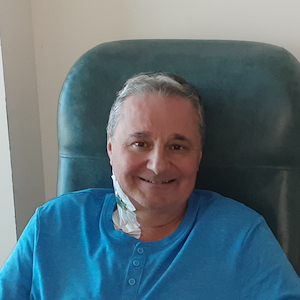
“He was thinking of referring me for that one, but you had to show a level of measurable disease to meet the trial criteria and my nonsecretory type of myeloma didn’t show up in my bloods all the time and would only show up on a scan, so all my medication was stopped.
“We waited to see how my levels changed. Eventually, they could show I had measurable disease and that’s when I was referred to the CAR T-cell trial, to see if I was suitable.
“My understanding is that they were looking for 400 patients worldwide to go on the trial, including 60 in Australia across six study sites.”
The CARTITUDE-4 study is comparing JNJ-68284528 (ciltacabtagene autoleucel), a CAR-T therapy directed against B-cell maturation antigen (BCMA), versus pomalidomide (Pomalyst®), bortezomib and dexamethasone (PVd) or daratumumab, pomalidomide and dexamethasone (DPd) in participants with relapsed and lenalidomide-refractory myeloma.
“I started a screening process at the end of October and got randomised to the CAR T-cell arm towards the end of November, and within five days I was having my T-cells collected,” said Andrew.
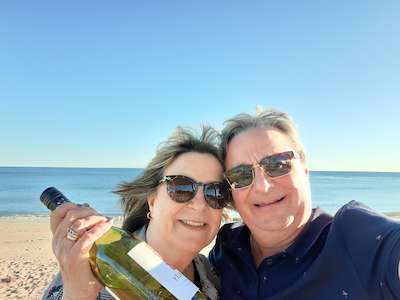
His T-cells were sent to the U.S. where the antigen receptors were attached and while waiting for them to return, Andrew had bridging therapy.
“This helps keep your myeloma under control. I had four treatments of daratumumab, pomalidomide, and dexamethasone,” he said.
After a short delay, Andrew’s T-cells came back to Australia, and he was given a conditioning regimen – three large doses of cyclophosphamide and fludarabine over three consecutive days.
“This was to reduce the number of my T-cells, so there was room for the returned ones when they put them back in,” said Andrew who had his infusion of CAR T-cells on January 25.
Initial and ongoing monitoring
Andrew was then closely monitored for the next nine days in hospital and “things were normal pretty much”, he said.
“Then, after the ninth day, my temperature started to go up which is what they were expecting. I got what is known as cytokine release syndrome (CRS),” said Andrew, and he was given antibiotics just in case he had developed an infection.
But it turned out to be CRS and his case was “quite mild, apparently”, according to Andrew.
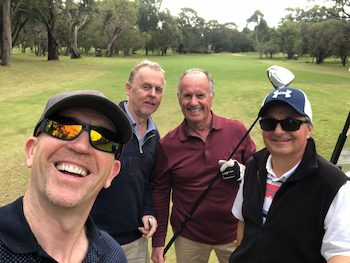
After his hospital discharge on February 8, Andrew needed to stay within half an hour of the hospital for seven days.
The drug sponsor, Janssen, met the cost of this accommodation for Andrew and Vivienne.
“And they give us help with parking and travelling costs when we go to the hospital,” said Andrew.
“There is no cost to us for participating in the trial.”
Andrew returned to the hospital most days to be checked and nurses also went to where he was staying to check his vitals.
Since moving home to Dawesville, an hour south of Perth, on February 15 (2021), Andrew continues to be monitored with regular bone marrow biopsies and PET scans, and a 24-hour urine collection once a month to check his protein level. He also has an immunoglobulin transfusion once-a-month “to help prop up my immune system because that’s still very low”.
Now, the only medication Andrew is on is the bisphosphonate, Zometa®, which he has once every six months for his bones, valacyclovir which he’s taken since his diagnosis to help prevent shingles, and Resprim to reduce his chances of getting infections such as pneumonia.
“I haven’t had the COVID jab yet because I can’t produce enough antibodies to mount a response to help the vaccine fight COVID,” he said. “My specialist, Hasib Sidiqi, will advise me when I should have it.”
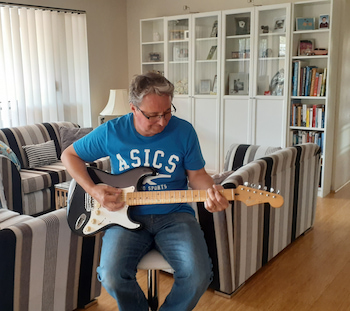
Not able to work and finding it tough financially
“My general health is okay. I feel pretty good, I still get tired, and my brain doesn’t work like it used to,” said Andrew.
“I struggle more with complex things and I’m not back working. The type of work I used to do was very detailed. I was measuring building materials off drawings for various trades on large construction sites. It involved a lot of documentation, drawings, cross-referencing, and figures, and I just can’t deal with that on a mental side anymore.”
“I won’t be able to go back to what I did before. I’ve closed my company down,” he explained.
“We had to sell our house in November 2020 for financial reasons, and we are now in rented accommodation. We do get a monthly salary insurance payment – for a maximum of two years – which helps towards our bills, but I have also started drawing on my superannuation, which is not ideal.
“Financially, it’s tough.”
When Andrew was first diagnosed, he spoke to a blood cancer support coordinator from the Leukaemia Foundation.
“She gave us a voucher for petrol and shopping, which was a big help at the time.”
Andrew’s myeloma has disappeared
Andrew has had four PET scans since having CAR T-cell therapy.
“They’ve showed the myeloma that I had and the lesions have all cleared up. There’s no active disease, so effectively the myeloma is under control by the CAR T-cells,” said Andrew.
“But this is so new and experimental. If the myeloma flares up again, the theory is that the CAR T-cells will target the areas where it is active and kill it off, so hopefully my three-monthly scans will show there’s no change to my situation.
“I’m on the trial for six years, hopefully,” said Andrew, and he will continue to be monitored regularly.
“I think, with CAR T-cells, the initial response to other blood cancers has been really good. It’s the longer-term data that they need, to be able to push this to being more of a mainstream treatment for myeloma and for it to be used earlier in the treatment process, to give people more chance of a longer and more normal life.”
Grateful to get on the CAR-T trial
“I can’t be thankful enough that I managed to get on the trial. It’s been terrific, but it’s been hard,” said Andrew.
“We’re just extremely grateful.”
“I’ve had a lot of support from family and friends in the UK and our friends in Australia, and my wife’s been marvellous, and without that I couldn’t have got through it. The medical team has been absolutely brilliant and I’ve been looked after very well by the doctors, nurses, trial assistants, and specialist myeloma support nurses.
“I was just very lucky that my disease was where it was at, at the time they started recruiting for the trial.”
“If my myeloma had come back six months either side of when it did, then I would have been on a different course of treatment.
“There were other trials available, but they were drug-based trials. The advantage of CAR T-cell is that you’re not on heavy chemo drugs.”
Getting on with life
“We try to live as normal a life as possible,” said Andrew.
“I’m in a much better place than I was before I went on the trial.
“I still get tired, so have a rest most days.”
“We haven’t really looked that far ahead and are living month-to-month as the results keep coming.
“It’s very early days still but our hospital team is ‘cautiously optimistic. I’ve been on the CAR T-cell trial the longest, so the longer I can keep doing well, the better hope it gives everybody,” he said.
The Dodds have lived in Australia for 22 years.
“It would be so good to go back to the UK for a visit, but I don’t think that’s going to be on the cards for quite a while,” said Andrew.
Last updated on January 3rd, 2023
Developed by the Leukaemia Foundation in consultation with people living with a blood cancer, Leukaemia Foundation support staff, haematology nursing staff and/or Australian clinical haematologists. This content is provided for information purposes only and we urge you to always seek advice from a registered health care professional for diagnosis, treatment and answers to your medical questions, including the suitability of a particular therapy, service, product or treatment in your circumstances. The Leukaemia Foundation shall not bear any liability for any person relying on the materials contained on this website.